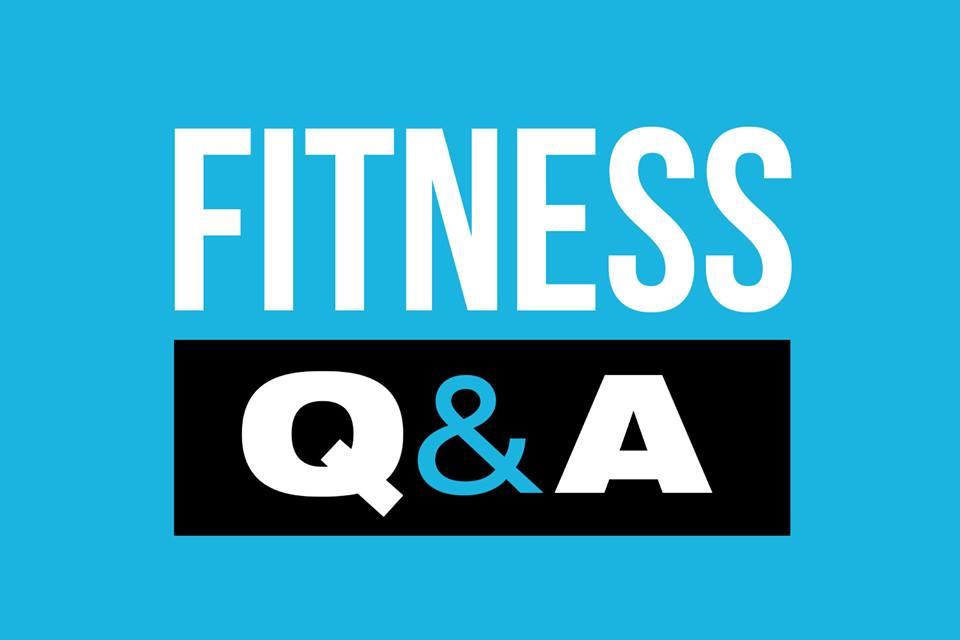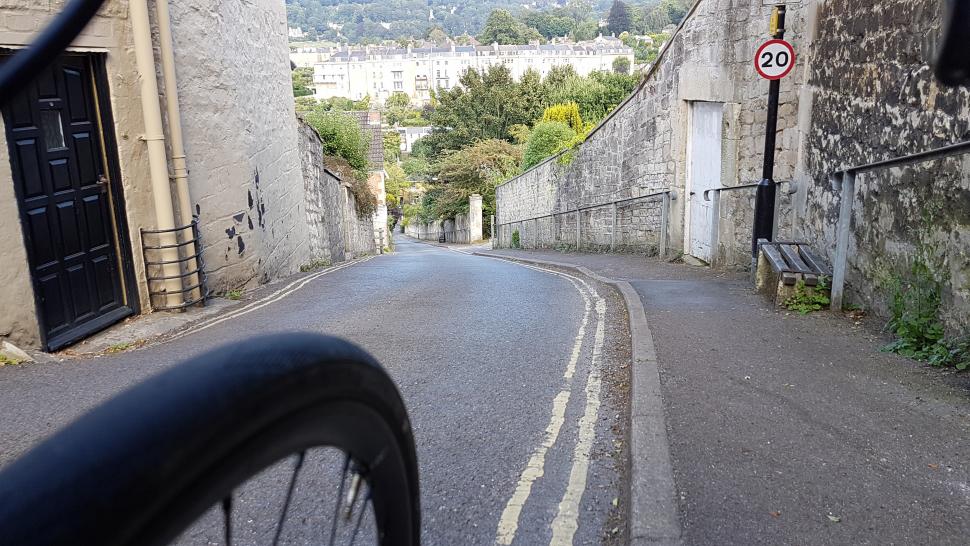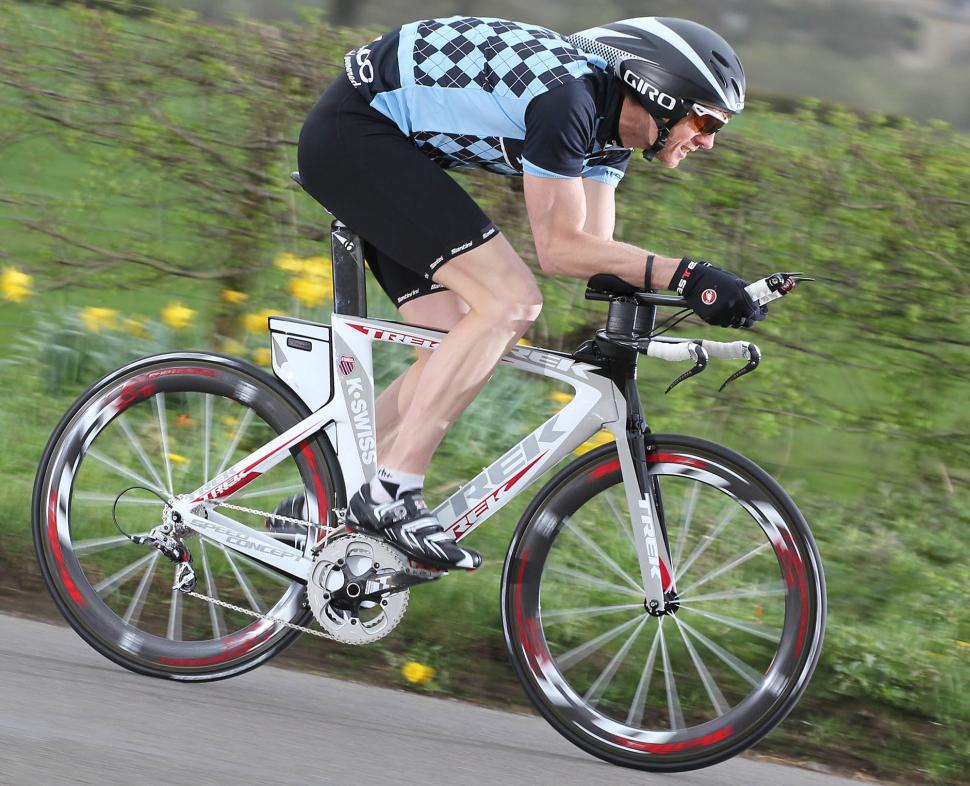- News
- Reviews
- Bikes
- Components
- Bar tape & grips
- Bottom brackets
- Brake & gear cables
- Brake & STI levers
- Brake pads & spares
- Brakes
- Cassettes & freewheels
- Chains
- Chainsets & chainrings
- Derailleurs - front
- Derailleurs - rear
- Forks
- Gear levers & shifters
- Groupsets
- Handlebars & extensions
- Headsets
- Hubs
- Inner tubes
- Pedals
- Quick releases & skewers
- Saddles
- Seatposts
- Stems
- Wheels
- Tyres
- Tubeless valves
- Accessories
- Accessories - misc
- Computer mounts
- Bags
- Bar ends
- Bike bags & cases
- Bottle cages
- Bottles
- Cameras
- Car racks
- Child seats
- Computers
- Glasses
- GPS units
- Helmets
- Lights - front
- Lights - rear
- Lights - sets
- Locks
- Mirrors
- Mudguards
- Racks
- Pumps & CO2 inflators
- Puncture kits
- Reflectives
- Smart watches
- Stands and racks
- Trailers
- Clothing
- Health, fitness and nutrition
- Tools and workshop
- Miscellaneous
- Buyers Guides
- Features
- Forum
- Recommends
- Podcast
 Fitness Q&A
Fitness Q&ACycling fitness Q&A - Hills, post ride fatigue, training after illness + more
Sometimes things can get in the way of achieving your training and fitness goals - aches, pains and general conundrums about stuff like training routines, nutrition and bike setup. All this applies for competitive riders at every level and for those that just want to be able to keep up with their mates on weekend rides, or get the best out of their weekday cycle commute.
If your cycling goals seem tantalisingly out of reach it’s time to get some expert advice to help you reach them. We’ve got just the person to help in the shape of top coach, Ric Stern.
Ric is well qualified to help you get more out of your cycling, he’s been a professional coach since 1998 and has guided riders both amateur and professional to numerous national championships, a number of World Championship golds, and gold and silver medals at the paralympics too.
Whatever type of cycling you do, if you've got a training for fitness related question then email Ric on fitness [at] road.cc and he'll do his best to answer it.
Hill power…
Two years ago I had major surgery for bowel cancer and 6 months of chemotherapy. Happily I’m cancer free at the moment, back on my bike and comfortably enjoying rides of up to 40 miles without too much difficulty providing that they are mostly on the flat. I’d love to be able to ride for longer and that means attacking some of the hills near me. Whenever the gradient goes above 5% I seem to run completely out of steam - high heart rate, legs screaming etc. I’m not carrying much excess weight (83kg and 193cm), I have an 11-32 cassette on the back so I guess the key will be training to gain some proper fitness. What can you advise that will help me? I should say I’m also time poor as I travel a lot. Hotel gyms are available to me in the middle of the week but I have to fit most of my cycling in from Friday to Sunday.
Matthew
Ric Stern: So glad to hear you’re recovering well, and getting back into cycling.
The issue of cycling uphill is most cyclists’ favourite question! You seem to have covered the other areas of weight and gearing, so it’s now mainly down to fitness, and power to mass ratio. If most of your training is only completed on Friday to Sunday, then this is one area to work on. Building in more regular training sessions - even if they’re only short and steady will help add more ‘returns’ to your main training. This would be best done via cycling (even on a gym bike), but could include other aerobic exercises such as running, swimming, rowing or walking in the gym, but could also extend to other aspects of fitness such as strength and conditioning. Here you could do exercises such as yoga, pilates, body weight exercises or weight training. These may all help.
Of course, the real gains will come from additional cycling, and even if these are gym related sessions on a gym bike/ergometer they could really work for you. The sessions could include doing efforts of around 5-mins at an effort just below that you do when you go uphill, but repeated maybe 3 to 6 times (i.e., 3 - 6 x 5-mins at a hardish effort) with several minutes of easy spinning in between.
This sort of work could also be done on one of your outdoor days as well, or some longer slightly easier efforts. I’d suggest starting at 20-mins and building up to 40-mins at an effort where it starts to become difficult to talk (i.e., you can’t talk in complete sentences without taking a breath and shutting up for a few seconds. Hopefully, people nearby don’t think you’re crazy if you’re talking to yourself!
If you would like Ric to answer your cycle training or health query drop him a line at: fitness [at] road.cc you can also follow him on Twitter @RSTSport or visit his website www.rstsport.com.
Why do I 'hit the wall' AFTER my ride?
After very long rides I'll return home feeling great, eat well and then several hours after feel really fatigued like I've 'Hit The Wall". However, no amount sugar/carbs will lift me and I'm often like this for 12 plus hours.
What's the physiology behind this and how do I avoid it?
Nigel
Ric Stern: Hi Nigel,
I think this is a fairly normal response for many people. Often, when we come home having just finished a long or intense ride, there could well be times when you have high level of adrenaline still. It could be that the ride was exciting, or you were riding fast and that this got your adrenaline flowing. Even though you may have replaced some of your muscle glycogen (it takes quite a while to replace it all) as the adrenaline or excitement of the ride wears off you could be, being left with the residual fatigue from the ride — simply, due to the excitement you may not have overly noticed it before.
That, and I’d try to avoid a hot bath straight after a ride. I find a shower much better, a bath always makes me feel very tired after a ride.
Getting training back on track after illness
I had a bad chest infection and was off the bike for 3 and half weeks. Before that I was on target for my events this year (TTs, Road race, Alpine Sportives) having trained hard all winter. Now feel like I can do low intensity training (Zone 2) but nothing more for a while. Expect to have lost some fitness/power but what's the best way avoid any further loss and to get back into it quickly?
Marcus
Ric Stern: It sucks when you’ve been training hard for your goals, only for it all to feel like it’s been wiped away by a chest infection. The good news is that while you may feel like you’ve lost lots of fitness the reality is that a significant portion of that loss will come back quickly, and the rest won’t take too long to come back.
There are several things i’d strongly suggest you do to come back promptly, but without overtaxing yourself the first week or two should be only low intensity exercise (say zone 1 or 2, depending on which training schema you use) and the duration should start moderately, but can be progressed rapidly if you feel okay. For example if you normally ride for say 4 hours on a long weekend ride, then you may want to limit your long rides for the next fortnight to about 50% of that duration, and during the week just keep it steady (again zone 1 or 2) and probably somewhere between 60 and 90-mins duration.
During the second week or so you should be starting to feel normal again, and may feel that this (above) regime is easier than what you’ve previously been doing. Keep at it (keeping it significantly easier than normal). As the week progresses and providing there are no signs of your infection coming back (and you don’t have any dirty phlegm etc, a temperature, or abnormal muscle aches) then you can start adding in a tiny bit of intensity. Depending on what you normally like to do I’d either suggest adding in about 15-mins of zone 3 (below TT effort) or some quite short TT efforts of about 60-secs on one or two days.
By the end of the second week, you should be at almost back to normal and by the start of the third week you could start your previous training regime again, but with a lower duration for all the efforts that you do.
Additionally, it’s also worth thinking about your diet. Evidence suggests that immediately post exercise is an excellent time to take in sufficient carbohydrates (see my answer to Dan in the last Fitness Q&A for more on that) which help not only restore muscle and liver glycogen, but importantly, also help restore immune function.
Get well soon!
Building cycling fitness after a heart attack
I had an MI (heart attack) three months ago. It wasn't too bad apparently and the prognosis is good (to the extent that, eventually, I should be able to do anything that I did before).
In terms of the riding I did, I am mainly a commuter riding 70-100 miles/week at a reasonable pace (15-17) with occasional weekend rides. Generally my aim has been to be fit enough to do any ride I want up to 100 miles without having to worry about it too much. I'd like to get back to regular commuting at the very least. Since, I've ridden about 50 miles in total.
However, the medical profession has been unable to provide much guidance about getting back to that kind of fitness level. Advice doesn't go beyond "Don't overdo it"! What do you think?
Steve
Ric Stern: Glad to hear you’re on the road to recovery.
Firstly, it’s incredibly important that you get approval prior to beginning cycling and other exercises. This does need to be agreed with your doctor in the first instance. Secondly, it’d be wrong of me to give too many suggestions, because i simply do not know enough about your actual health. When I coach someone (even without having had a heart attack) we ask lots of questions about them. This becomes doubly important or more when someone has had a heart attack.
However, once you have approval then you should start slowly and gently. The advice of “don’t overdo it” is spot on!
Ride gently and keep the duration short at first. For example after I damaged my knee one year I ended up riding easy for 15 to 20-mins every other day for a month until I could then start extending the rides. You may also need to follow a similar progression.
While riding short and easy may not feel like much, or feel like it’s providing you with any training, this really is what you want to keep to for a good while (this could be weeks or months depending on how bad your MI was). You should always err on the side of caution. This will help prevent overdoing things and potentially making yourself ill again or setting yourself back. It may be that as you go through the first few weeks that you can add on small amount
You’ll also have to trust in how your body feels. I’d strongly suggest that the first month or so should be easy, and then and only then if you feel that your body has been responding well should you attempt to extend the duration of the rides by larger amounts. Additionally, you should have plenty of rest in your training and not be building large amounts of fatigue. This may also be a good time to include some other forms of aerobic exercise such as walking and swimming.
Wishing you well in your cycling and if you have any other queries about progressing your cycling please give me a shout.
If you would like Ric to answer your cycle training or health query drop him a line at: fitness [at] road.cc you can also follow him on Twitter @RSTSport or visit his website www.rstsport.com(link is external).
For more advice on training you can also check out our six week Six steps to fitness training program
Ric Stern established RST Sport in 1998 and has been using an evidence-based approach to coaching to help grassroots athletes to world-class athletes perform at their best. Ric can be reached through www.cyclecoach.com.



The obvious answer to that question is whether you support genocide or not. It's similar to claiming that Nazis shouldn't be punched because that...
The issue is we just end up with wider vehicles parked on the road because they won't fit the garage *, and it being more likely that drivers will...
He is up against the global trading system, which has obviously been in the news a lot lately. Framebuilders in other countries can undercut him,...
Stouport residents bemoan huge traffic queues through town...
Some kind of lens cleaner apparently
The trailer seems to connect to both ends of the rear axle. Can it do tight corners without dragging the tyre sideways?
Motorists have always been unkind to cyclists, but distracted driving is adding to the problem....
Have you owned Bont shoes? In my experience even the widest Lake shoes have had a bizarre form of narrowing way too much in the toe area. But the...
Not sure if this is possible, but this news letter goes out all over the world, and some places like Decathlon does not send stuff to America, in...
I'm confused as to why you'd need bib shorts indoors.